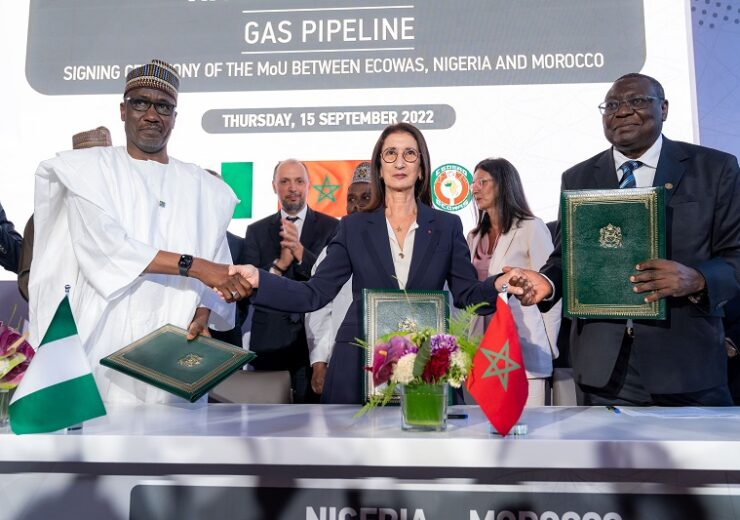The Morocco-Nigeria gas pipeline will be built along the West African coast from Nigeria and will traverse through Benin, Togo, Ghana, Côte d’Ivoire, Liberia, Sierra Leone, Guinea, Guinea Bissau, Gambia, Senegal and Mauritania and eventually to Morocco from where it will be linked to the Maghreb Europe gas pipeline

Signing of the MoU for the Morocco-Nigeria gas pipeline project took place in Rabat. (Credit: ONHYM)
Morocco, Nigeria, and the Economic Community of Western African States (ECOWAS) signed a memorandum of understanding (MoU) to kick-start the $25bn Morocco-Nigeria gas pipeline project.
The MoU for the nearly 5,600km long offshore pipeline was signed by the parties in Rabat, Morocco.
Morocco was represented by its National Agency for Mines and Hydrocarbons (ONHYM), while the Nigerian National Petroleum Company (NNPC) inked the MoU on behalf of Nigeria.
The project will be funded on 50/50 equity by NNPC and ONHYM.
According to ONHYM, the MoU confirms ECOWAS’ commitment as well as the involvement of all the crossing countries.
The Morocco-Nigeria gas pipeline project will deliver gas throughout Western Africa, while opening up a new export route to Europe.
It will be built along the West African coast of Nigeria. Travelling via Benin, Togo, Ghana, Côte d’Ivoire, Liberia, Sierra Leone, Guinea, Guinea Bissau, Gambia, Senegal and Mauritania, the pipeline will eventually reach Morocco.
From Morocco, the new gas pipeline will be linked to the Maghreb Europe gas pipeline with the objective to reach the gas network of Europe, said ONHYM.
Besides, the Morocco-Nigeria gas pipeline will supply natural gas to the landlocked countries of Niger, Mali, and Burkina Faso.
ONHYM stated: “This strategic project will help improving the living standard of the populations, the integration of the economies of the sub-region, and the reduction of the desertification thanks to a sustainable and reliable supply of gas.
“The pipeline will also have significant economic benefits for the region, through the use of a clean energy that meets the continent’s new commitments to protect the environment.
“The project will give to Africa a new economic, political and strategic dimension.”
Earlier this year, the OPEC Fund signed an agreement to provide a loan of $14.3m towards the front end engineering study (FEED) phase 2 of the Morocco-Nigeria gas pipeline project. The phase 2 FEED study is estimated to cost $90.1m.
In July this year, DORIS Engineering and its joint venture partner ILF Consulting Engineers won the tender for providing consulting services for the FEED phase II of the African pipeline project.
The FEED phase 1 of the project was undertaken by Penspen. Under a contract won in January 2019, the company was responsible to carry out a detailed review of the feasibility study results and evaluation of the gas demand and supply study.
